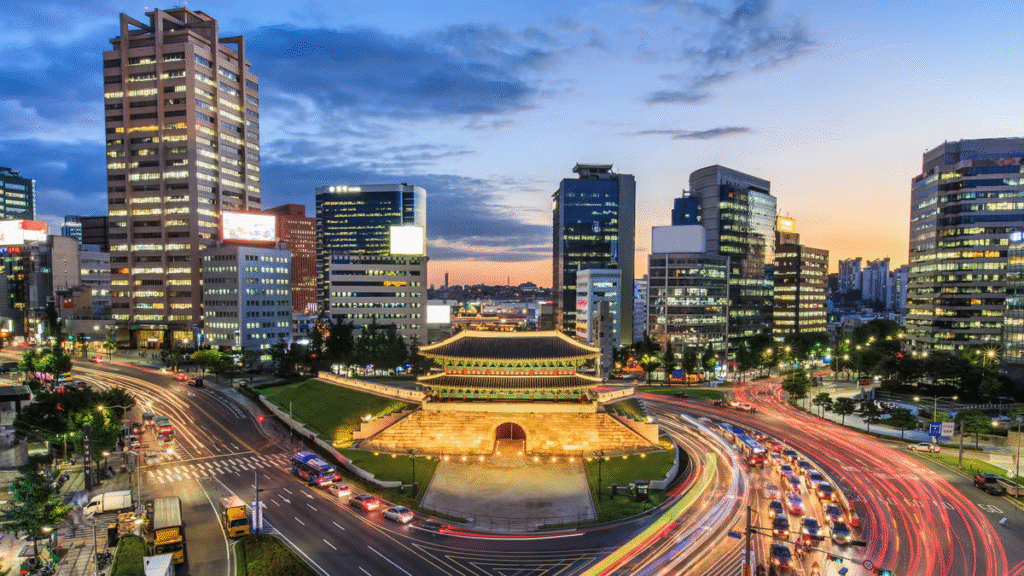While many African countries are making significant strides in technology, such as expanding internet access, developing fintech platforms, and fostering startup scenes, a substantial gap remains between the continent’s progress and that of global tech leaders. Even when compared to countries that aren’t at the very top, Africa still trails in key areas like R&D investment, digital infrastructure, and long-term innovation policies.
But what sets the world’s most advanced tech countries apart? It’s not just about flashy gadgets or big headlines. These nations have deeply woven technology into the way people live, work, learn, and move around. From smart cities to robot-assisted healthcare and real-time digital services, these countries prove that true tech leadership comes from long-term planning, bold investment, and a willingness to adapt fast.
Here’s a look at some of the top countries shaping the future of technology — and how they’re making a global impact:
South Korea

South Korea’s internet is blazing fast, with average speeds over 120 Mbps and some homes reaching 10 Gbps. It’s also a global leader in semiconductors (thanks to Samsung) and public services powered by AI, like facial recognition in Seoul’s transport systems. The government spends nearly 5% of its GDP on R&D, one of the highest rates in the world.
Japan

Japan blends automation into everyday life. Whether it’s robotic caregivers in hospitals or drones delivering packages, the tech is practical and widely used. Japan also produces more than 20% of the world’s industrial robots, quietly powering factories across the globe.
Germany

Germany’s “Industry 4.0” plan is transforming its factories into smart, AI-driven operations. It’s also a major player in clean tech, especially hydrogen fuel, and is helping to drive the future of self-driving cars through brands like Audi and Mercedes-Benz.
United States

The U.S. is home to tech giants like Google, Apple, Meta, Tesla, and Microsoft, and spends over $700 billion a year on research. From Mars missions to cutting-edge AI, American universities and startups constantly push what’s possible. The U.S. also holds the highest number of tech patents globally.
China

China’s tech is hard to ignore. From facial-recognition payment systems to leading the world in 5G and solar panel production, the country is moving fast. It’s even built its own GPS system (BeiDou) to rival America’s. Huge government funding keeps its tech sectors ahead of the curve.
Singapore

Singapore runs like a well-oiled digital machine. Citizens access over 1,000 government services online using a digital ID. The city uses smart traffic lights, sensor-equipped streetlamps, and even tests self-driving cars in real traffic — all part of its “Smart Nation” vision.
Sweden

Sweden’s nearly cashless society is just the beginning. The country leads in green innovation and digital public services. It invested in teaching digital skills to citizens years ago, ensuring that even rural areas enjoy fast internet and smart services.
Israel

Israel punches well above its weight. With over 6,000 tech startups, it has more per capita than almost any other country. Many of these grew out of military tech units, especially in cybersecurity. Its innovation in driver-assistance systems (like Mobileye) is used worldwide.
Finland

In Finland, technology is part of everyday life — from AI-run welfare systems to 6G research partnerships between universities and industry. Helsinki even has a one-stop app for government services, transportation, and more.
Switzerland

Switzerland combines world-class science with smart innovation. Home to CERN’s Large Hadron Collider, it’s also a hotspot for AI and medtech. Its cities are highly connected, and it has one of the most educated tech workforces in Europe.
Canada

Canada bet early on artificial intelligence and is now reaping the benefits. Toronto and Montreal are global hubs for AI research. Friendly immigration and government support make Canada a welcoming place for international tech talent.
France

France is making serious moves in smart infrastructure. Think self-driving trains, drones inspecting nuclear plants, and 3D-printed homes. Its national research institutions back thousands of tech projects annually, especially in green and defense tech.
United Kingdom

The UK focuses heavily on emerging technologies like quantum computing and AI ethics. London is a fintech capital, while universities like Oxford and Cambridge drive global scientific breakthroughs. The country has also invested billions in its national AI and space strategies.
Netherlands

You may know the Netherlands for its bikes and canals, but it’s also the only country that makes the machines used to create today’s most advanced computer chips (thanks to ASML). Dutch cities run smart traffic systems, and clean energy is central to their tech vision.
Australia

Australia has quietly contributed a lot, like inventing Wi-Fi. Today, it’s investing in AI-powered climate prediction, satellite-based remote healthcare, and green energy. Cities like Melbourne and Sydney are building strong startup communities around robotics and sustainability.
What makes these countries globally significant isn’t just that they create cool products; it’s that their technologies are changing how the world works. They shape the future of transportation, communication, and healthcare, create platforms and devices used by billions daily, influence international policies on privacy, digital ethics, and innovation, set standards that others, including African nations, often adopt later
For Africa to compete on the global stage, it must look beyond short-term fixes. That means: Boosting investment in R&D, training more tech talent, improving digital infrastructure, and supporting startups with long-term vision, using tech to solve real problems, not just chase trends
By studying how these nations achieved tech success, African countries can develop strategies that fit their own needs, and maybe even leapfrog some of today’s tech leaders in the future.




